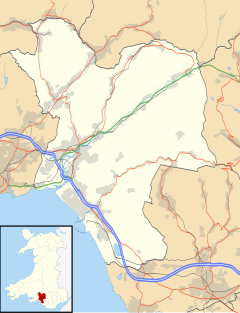Aberdulais
| Aberdulais | |
|---|---|
| Aberdulais shown within Neath Port Talbot | |
| Population | 2,400 (2011 census) |
| OS grid reference | SS773995 |
| Principal area | |
| Ceremonial county | |
| Country | Wales |
| Sovereign state | United Kingdom |
| Post town | NEATH |
| Postcode district | SA10 |
| Dialling code | 01639 |
| Police | South Wales |
| Fire | Mid and West Wales |
| Ambulance | Welsh |
| EU Parliament | Wales |
| UK Parliament | |
| Welsh Assembly | |
| Councillors |
|
Aberdulais is a village in Neath Port Talbot, Wales, lying on the River Neath. The village grew around the Aberdulais Falls, the site of successive industries and now a hydro-electric station. The National Trust owns and administers the site.
The name Aberdulais is from the Welsh for the mouth of the River Dulais.
Aberdulais has a lengthy industrial history thanks to the abundant supply of energy derived from the waterfall and the presence in the vicinity of coal and timber. The first business here was a copper smelting industry, using ore delivered via boat from Cornwall. Over the years the site was successively used as an ironworks, a cornmill and a tinplate works. The Welsh tinplate industry was very successful for a time, until the American government levied heavy duties on imported tinplate.
The present water wheel is a modern steel structure 8.2 m (27 ft) in diameter. It generates electricity for use on the site, any excess current being fed into the national grid.
In the eighteenth and nineteenth centuries, various artists visited the falls to paint. In 1795, J. M. W. Turner used a sketch he made here of the waterfall and cornmill to paint his watercolour "Aberdulais Mill, Glamorganshire" which hangs at the National Library of Wales. John Ruskin also painted here.
Local attractions include a canal and the Cefn Coed Colliery Museum. Aberdulais Falls and the associated industrial infrastructure are in the care of the National Trust in recognition of the site's value as a key part of the region's industrial heritage. The water wheel at Aberdulais falls produces £20,000 worth of electricity that powers the site, and the surplus is sold back to the national grid.
...
Wikipedia

